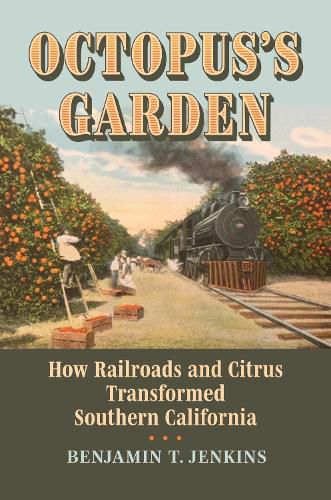Readings Newsletter
Become a Readings Member to make your shopping experience even easier.
Sign in or sign up for free!
You’re not far away from qualifying for FREE standard shipping within Australia
You’ve qualified for FREE standard shipping within Australia
The cart is loading…






As Southern California recovered from the collapse of the cattle industry in the 1860s, the arrival of railroads-attacked by newspapers as the greedy "octopus"-and the expansion of citrus agriculture transformed the struggling region into a vast, idealized, and prosperous garden. New groves of the latest citrus varieties and new towns like Riverside quickly grew directly along the tracks of transcontinental railroads. The influx of capital, industrial technology, and workers, especially people of color, energized Southern California and tied it more closely to the economy and culture of the United States than ever before.
Benjamin Jenkins's Octopus's Garden argues that citrus agriculture and railroads together shaped the economy, landscape, labor systems, and popular image of Southern California. Orange and lemon growing boomed in the 1870s and 1880s while railroads linked the region to markets across North America and ended centuries of geographic isolation for the west coast. Railroads competed over the shipment of citrus fruits from multiple counties engulfed by the orange empire, resulting in an extensive rail network that generated lucrative returns for grove owners and railroad businessmen in Southern California from the 1890s to the 1950s.
While investment from white Americans, particularly wealthy New Englanders, formed the financial backbone of the Octopus's Garden, citrus and railroads would not have thrived in Southern California without the labor of people of color. Many workers of color took advantage of the commercial developments offered by railroads and citrus to economically advance their families and communities. However, these people of color also suffered greatly under the constant realities of bodily harm, low wages, and political and social exclusion. Promoters of the railroads and citrus cooperatives touted California as paradise for white Americans and minimized the roles of non-white laborers by stereotyping them in advertisements and publications. These practices fostered conceptions of California's racial hierarchy by praising privileged whites and maligning the workers who made them prosper.
The Octopus's Garden continues to shape Southern Californians' understanding of their past. In bringing together multiple storylines, Jenkins provides a complex and fresh perspective on the impact of citrus agriculturalists and railroad companies in Southern Californian history.
$9.00 standard shipping within Australia
FREE standard shipping within Australia for orders over $100.00
Express & International shipping calculated at checkout
As Southern California recovered from the collapse of the cattle industry in the 1860s, the arrival of railroads-attacked by newspapers as the greedy "octopus"-and the expansion of citrus agriculture transformed the struggling region into a vast, idealized, and prosperous garden. New groves of the latest citrus varieties and new towns like Riverside quickly grew directly along the tracks of transcontinental railroads. The influx of capital, industrial technology, and workers, especially people of color, energized Southern California and tied it more closely to the economy and culture of the United States than ever before.
Benjamin Jenkins's Octopus's Garden argues that citrus agriculture and railroads together shaped the economy, landscape, labor systems, and popular image of Southern California. Orange and lemon growing boomed in the 1870s and 1880s while railroads linked the region to markets across North America and ended centuries of geographic isolation for the west coast. Railroads competed over the shipment of citrus fruits from multiple counties engulfed by the orange empire, resulting in an extensive rail network that generated lucrative returns for grove owners and railroad businessmen in Southern California from the 1890s to the 1950s.
While investment from white Americans, particularly wealthy New Englanders, formed the financial backbone of the Octopus's Garden, citrus and railroads would not have thrived in Southern California without the labor of people of color. Many workers of color took advantage of the commercial developments offered by railroads and citrus to economically advance their families and communities. However, these people of color also suffered greatly under the constant realities of bodily harm, low wages, and political and social exclusion. Promoters of the railroads and citrus cooperatives touted California as paradise for white Americans and minimized the roles of non-white laborers by stereotyping them in advertisements and publications. These practices fostered conceptions of California's racial hierarchy by praising privileged whites and maligning the workers who made them prosper.
The Octopus's Garden continues to shape Southern Californians' understanding of their past. In bringing together multiple storylines, Jenkins provides a complex and fresh perspective on the impact of citrus agriculturalists and railroad companies in Southern Californian history.